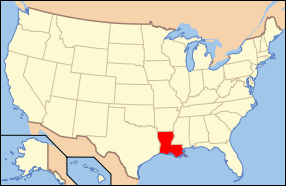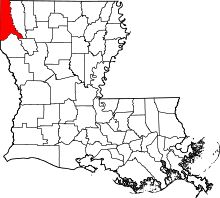Strand Theatre (Shreveport, Louisiana)
|
Strand Theatre | |
|
Strand Theatre | |
 | |
| Location | 630 Crockett Street, Shreveport, Louisiana |
|---|---|
| Coordinates | 32°30′37″N 93°45′00″W / 32.51022°N 93.74992°WCoordinates: 32°30′37″N 93°45′00″W / 32.51022°N 93.74992°W |
| Area | less than one acre |
| Built | 1923 |
| Built by | Stewart-McGehee |
| Architect | Emile Weil |
| Architectural style | Other, Eclectic |
| Part of | Shreveport Commercial Historic District (#82002760) |
| NRHP reference # | 77000668[1] |
| Significant dates | |
| Added to NRHP | May 26, 1977 |
| Designated CP | May 16, 1997 |
The Strand Theatre in Shreveport, Louisiana, United States, opened in 1925 as a Vaudeville venue and was nicknamed "The greatest theatre of the South" and the "Million Dollar Theatre" by its builders, Julian and Abraham Saenger of Shreveport, owners of the Saenger Amusements Company, which operated theaters throughout the American South and in Central America. By the 1940s it had evolved into a movie cinema, which it remained until its closure in 1977. Threatened with demolition, it was saved by a coalition of concerned citizens who restored it to its original grandeur over a nearly seven-year period.[2] It is the "Official State Theatre of Louisiana".[3][4] Since its re-opening in 1984 following restoration it has served as a performing arts venue, featuring the Shreveport Broadway Series and other traveling Off-Broadway shows.
Emile Weil and Charles G. Davis of New Orleans were the architects of the theater with interior design work by Paul Heerwagen of Arkansas. Construction foreman was Ernest Raleigh Darrow of Shreveport. The Strand was a flagship theatre for Saenger Amusements Company and its successor, Saenger-Ehrlich Enterprised, a forerunner of Paramount Pictures.
During the 1960s, when the Strand was in use as a cinema, the facility was desegregated through the efforts of the Reverend Herman Farr, who in 1978 became one of the first three African Americans to have served on the Shreveport City Council.[5]
In 1977, the theatre was placed on the National Register of Historic Places.[1][6][7][8] It also became a contributing property of Shreveport Commercial Historic District when its boundaries were increased on May 16, 1997.[9]
- The Strand from the Crockett Street side showing the full size of the building
.jpg) The Strand under renovation in 2015
The Strand under renovation in 2015
See also
References
- 1 2 National Park Service (2010-07-09). "National Register Information System". National Register of Historic Places. National Park Service.
- ↑ Eric J. Brock (1966-2011), "The Strand, Still Grand, Has Deep Roots Here," Shreveport Times, 1995-09-23
- ↑ "Strand Theatre". saengeramusements.com. Retrieved November 11, 2017.
- ↑ Jim Montgomery (1945-2013), Ladies and Gentlemen, The Strand (Baton Rouge, Louisiana: Moran Publishers, 2000
- ↑ http://m.shreveporttimes.com/apps/pbcs.dll/article?AID=/20080611/OBITUARIES01/806110341/1045/OBITUARIES&template=wapart
- ↑ S. Judd Tooke (November 1976). "National Register of Historic Places Inventory/Nomination Form: Strand Theatre". National Park Service. Retrieved April 18, 2018. With 23 photos from 1977.
- ↑ Louisiana historic marker at Strand Theatre, Crockett at Louisiana streets, Shreveport, Louisiana
- ↑ "The Strand Theatre". thestrandtheatre.com. Retrieved November 11, 2017.
- ↑ "Shreveport Commercial Historic District" (PDF). State of Louisiana's Division of Historic Preservation. Retrieved April 18, 2018.
External links
| Wikimedia Commons has media related to Strand Theater, Shreveport, Louisiana. |


